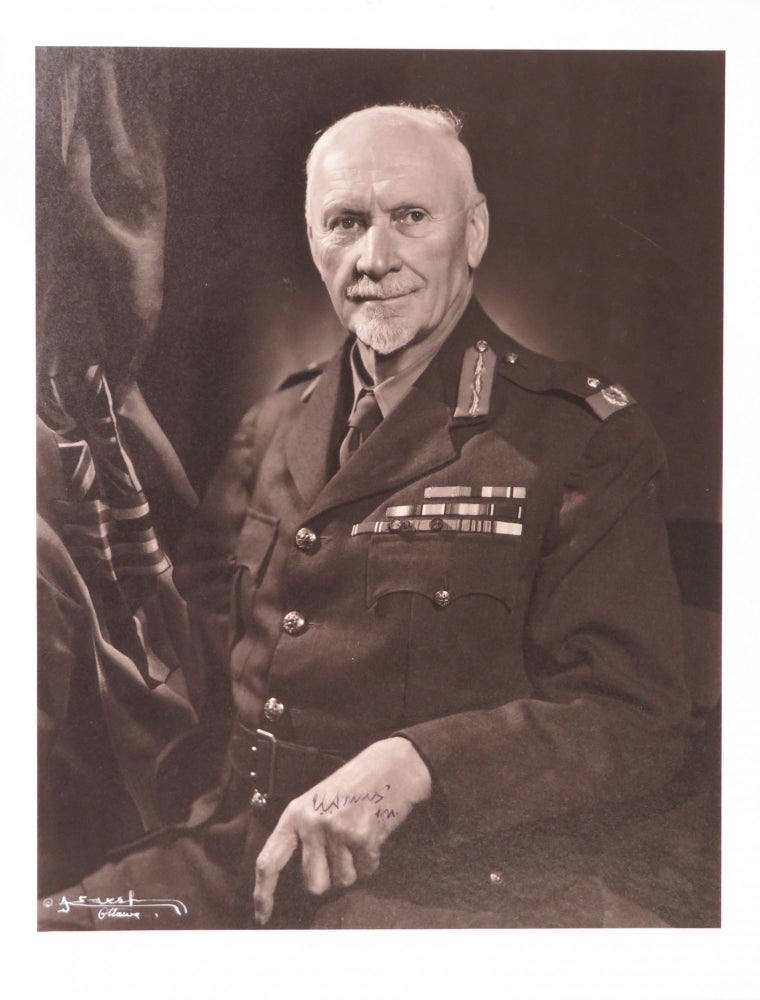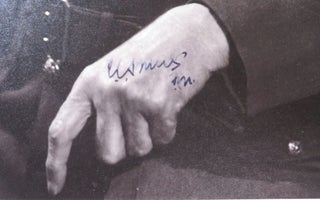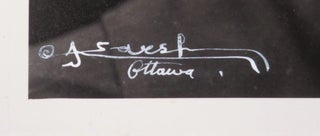Yousuf Karsh's striking Second World War photographic portrait of South African Prime Minister and global statesman Field Marshal Jan Christiaan Smuts, signed by both Karsh and Smuts
Ottawa, Canada: Yousuf Karsh, 1943. Photograph. This is a striking Second World War photographic portrait of one of the of the most enduring leaders of the first half of the twentieth century, captured by one of the most famous portrait photographers of the second half of the twentieth century, signed by both Jan Smuts and Yousuf Karsh.
This exceptional, large gelatin silver print of Karsh’s 1943 portrait of Smuts is printed on a 12 x 15.5 inches (30.5 x 39.4 cm) sheet of matte photo paper backed with heavy card, the image measuring 10.5 x 13.5 inches (26.7 x 34.3 cm). Smuts signed in black across the back of his left hand “J. Smuts | F.M.” (Field Marshal). Karsh signed in white at the lower left “© Y Karsh | Ottawa.” Condition is very good, eminently frameable, with only trivial wear to the edges of the white margins and a few insignificant blemishes to the image. A similar portrait of Smuts in the National Portrait Gallery, presumably taken during the same sitting, is attributed to 1943, thus dating this image as well.
Renowned South African soldier and statesman Jan Christiaan Smuts (1870-1950). Smuts served as both the 2nd (1919-1924) and 4th (1939-1948) Prime Minister of South Africa. He was an important figure in world politics, serving in the British War Cabinet in both the First and Second World Wars, and having a hand in the formation of both the League of Nations and of the United Nations. Smuts was the only person to sign the peace treaties ending both the First and Second World Wars, and was the only person to sign the charters of both the League of Nations and of the United Nations. With respect to the former, “he may justly be called one of the principal progenitors of the League of Nations.” (ODNB)
His role in defending the British Empire is remarkable; Smuts began his military career as one of the best soldiers fighting the British during the Boer War (1899-1902). In 1899, when Winston Churchill was captured by the Boers, Smuts was Churchill’s Afrikaner interrogator and opposed Churchill’s release. Churchill famously escaped. The two men eventually developed a deep mutual regard and working relationship that spanned four decades and both world wars. In 1900, neither man could have imagined that Smuts would become a Field Marshal in the British Army under British Prime Minister Winston Churchill in 1941. Smuts was a trusted advisor to Churchill during the latter’s wartime premiership. Smuts was a trusted advisor to Churchill during the latter’s wartime premiership, and called Churchill “indispensable”, praising his greatness as both a leader and a man. The regard was unequivocally mutual. Churchill often praised Smuts’s “wisdom” and, on VE day in 1945, told Smuts “Your presence beside me in the councils of the Empire and at the fronts in those long hard years has been to me a constant source of strength and inspiration for which I am most sincerely grateful.”
Like that of Smuts, the life of Yousuf Karsh (1908-2002) was inextricably marked by association with Winston Churchill. Born in Armenian Turkey, Yousuf Karsh (1908-2002) had fled on foot with his family to Syria before immigrating to Canada in 1924 as a refugee. In late December 1941, when Karsh was 33, he was invited by the Canadian government to capture Churchill’s portrait after Churchill addressed the Canadian Parliament. The resulting image, which Karsh titled “The Roaring Lion”, appeared on the cover of Life magazine and established Karsh’s international reputation. Karsh went on to photograph an incredible array of the world’s most prominent personalities.
“During his career he held 15,312 sittings, produced over 250,000 negatives and left an indelible artistic and historic record of the men and women who shaped the twentieth century.” As he did for Jan Smuts in this photograph, Karsh both encapsulated and amplified major figures spanning politics, science, and culture. Karsh’s portrait of Churchill remains an archetypal portrayal of his character. Item #006273
Price: $1,250.00



